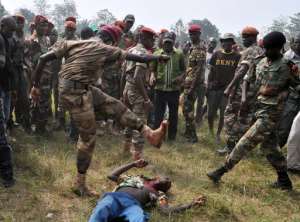
Bangui (Central African Republic) (AFP) - The UN's top envoy and France on Thursday urged the Central African authorities to punish soldiers involved in the gruesome public lynching of a suspected ex-rebel.
UN representative Babacar Gaye said in Bangui that Wednesday's killing was "unacceptable" and "must be properly investigated and the culprits punished and made an example of".
Soldiers stabbed the man immediately after a military ceremony in the capital, beat him and crushed him with concrete blocks before dragging his lifeless body through the streets.
The mob dismembered the corpse, set it on fire and some then posed for pictures in front of it.
The lynching, widely captured on camera, happened just moments after new interim President Catherine Samba Panza spoke of her pride in seeing the country's armed forces contribute to national security again.
A spokesman for the French force that deployed in the Central African Republic two months ago in a bid to stem spiralling sectarian violence said that the French troops present at the ceremony were only tasked with escorting their general and had already left when the lynching began.
"France condemns the heinous acts that followed the gathering of parts of the Central African armed forces," French foreign ministry spokesman Romain Nadal said in Paris, demanding "a punishment that sets an example".
French Defence Minister Jean-Yves Le Drian, who is due in Bangui on February 12, said in an interview that an extension of the UN mandate for France's 1,600-strong contingent was "likely" because of ongoing violence.
Gaye condemned the atmosphere of impunity in the country that allowed "a man to be attacked in broad daylight and his body desecrated."
Dozens of witnesses saw the Central African troops who took part in the lynching -- some of whom were reunited for the first time since a rebellion toppled president Francois Bozize in March 2013 -- but no soldiers were arrested.
Asked about the inaction of African Union troops who were present but failed to intervene, Gaye said: "Just because they are authorised to act does not mean that they should immediately engage in an armed confrontation. Lethal force should be used with restraint".
The International Federation of Human Rights said that "the setting up of a special unit to investigate and prepare trials dealing with these crimes must be a priority."
'Missing links'
"All current operations to secure Bangui suffer from the lack of two missing links," Gaye said, referring to a functioning police force and judiciary.
Le Drian told French radio Thursday that while the Sangaris mission's six-month mandate could be extended, a UN peacekeeping mission was needed in the long run.
"Otherwise this country, which is subject to regular atrocities, risks falling into chaos and it's very dangerous for a country in central Africa -- near risk areas like the Sahel, the Horn of Africa and the Great Lakes -- to collapse," he said.
The violence spiralled out of control when ex-rebels from the Seleka group that seized power nearly a year ago went rogue and carried out atrocities against the Christian majority.
The campaign of killings, rape and looting sparked revenge attacks by Christian vigilantes known as "anti-balaka" (anti-machete).
The UN and relief groups say around half of the country's 4.6 million population desperately needs humanitarian assistance while one in five inhabitant has been displaced.
The French troops are supporting some 5,500 soldiers of the MISCA force. Both contingents are based at Bangui airport and patrol the streets to disarm fighters and halt looting.
Le Drian said that the presence of French troops had brought back some stability to Bangui but not to the rest of the country, which is largely in the hands of local warlords.
Reports by aid workers from several towns in the interior tell of attacks by armed bands, killing and looting, with nobody to prevent the violence.




 We’ll no longer tolerate your empty, unwarranted attacks – TUC blasts Prof Adei
We’ll no longer tolerate your empty, unwarranted attacks – TUC blasts Prof Adei
 Bawumia donates GHc200,000 to support Madina fire victims
Bawumia donates GHc200,000 to support Madina fire victims
 IMF to disburse US$360million third tranche to Ghana without creditors MoU
IMF to disburse US$360million third tranche to Ghana without creditors MoU
 Truck owner share insights into train collision incident
Truck owner share insights into train collision incident
 Paramount chief of Bassare Traditional Area passes on
Paramount chief of Bassare Traditional Area passes on
 Two teachers in court over alleged illegal possession of BECE papers
Two teachers in court over alleged illegal possession of BECE papers
 Sunyani: Victim allegedly shot by traditional warriors appeals for justice
Sunyani: Victim allegedly shot by traditional warriors appeals for justice
 Mahama vows to scrap teacher licensure exams, review Free SHS policy
Mahama vows to scrap teacher licensure exams, review Free SHS policy
 Government will replace burnt Madina shops with a new three-story, 120-store fac...
Government will replace burnt Madina shops with a new three-story, 120-store fac...
